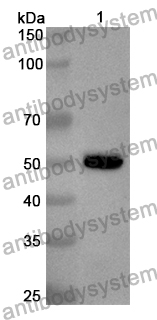Catalog No.
PHK20901
Species reactivity
Human
Host species
Rabbit
Isotype
IgG
Clonality
Polyclonal
Immunogen
E. coli - derived recombinant Human SMYD3 (Met1-Ser428).
Tested applications
ELISA: 1:4000-1:8000, IHC: 1:50-1:100, WB: 1:1000-1:4000
Target
Zinc finger MYND domain-containing protein 1, SET and MYND domain-containing protein 3, SMYD3, ZMYND1, Histone-lysine N-methyltransferase SMYD3, ZNFN3A1
Purification
Purified by antigen affinity column.
Accession
Q9H7B4
Applications
ELISA, IHC, WB
Form
Liquid
Storage buffer
0.01M PBS, pH 7.4, 50% Glycerol, 0.05% Proclin 300.
Stability and Storage
Use a manual defrost freezer and avoid repeated freeze thaw cycles. Store at 2 to 8°C for frequent use. Store at -20 to -80°C for twelve months from the date of receipt.
Oncogenic activation of SMYD3-SHCBP1 promotes breast cancer development and is coupled with resistance to immune therapy., PMID:40157910
Matrix stiffness-dependent PD-L2 deficiency improves SMYD3/xCT-mediated ferroptosis and the efficacy of anti-PD-1 in HCC., PMID:39159723
A SMYD3/ITGB6/TGFβ1 Positive Feedback Loop Promotes the Invasion and Adhesion of Ovarian Cancer Spheroids., PMID:34621667
ANKHD1 is required for SMYD3 to promote tumor metastasis in hepatocellular carcinoma., PMID:30646949
A novel nuclear Src and p300 signaling axis controls migratory and invasive behavior in pancreatic cancer., PMID:26695438
Differential gene expression signatures between colorectal cancers with and without KRAS mutations: crosstalk between the KRAS pathway and other signalling pathways., PMID:21531130
Mutated KRAS results in overexpression of DUSP4, a MAP-kinase phosphatase, and SMYD3, a histone methyltransferase, in rectal carcinomas., PMID:20725992

